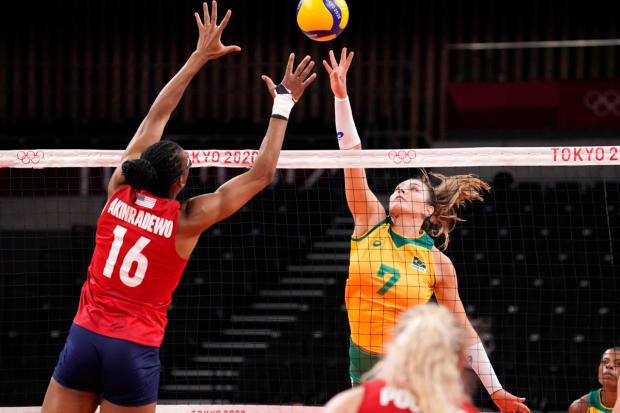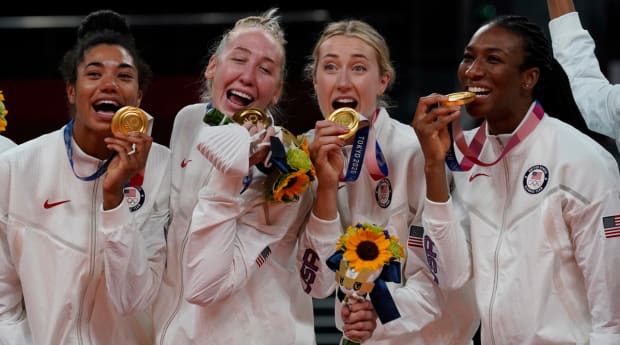The women finally broke through with a win over Brazil in Tokyo.
TOKYO — When the ball sank to the ground for the last time, so did they. Fifty-seven years of Olympic volleyball, 15 quadriennials spent working toward this, six medal opportunities and until Sunday, the U.S. women were left only with disappointment. This year would be different, they told themselves. They had worked so hard. They had suffered so many frustrations. They had heard so many other countries’ anthems.
In the third set, in their second attempt at match point, the ball found outside hitter Jordan Larson. Of course it did. She had carried this weight longer than almost anyone: Larson, 34, joined the national team in 2009. She took silver in London and bronze in Rio. She had already announced that these Olympics would be her last. She slammed the ball just beyond the reach of Brazil’s libero, Camila Brait. The final point sealed the Americans’ victory in three dominant sets, 25-21, 25-20, 25-14, and gave the U.S. its first Olympic gold medal in women’s volleyball. It was the U.S.’s 39th gold of this Olympics, top among all countries.
Larson dropped to her knees, then to the floor. So did her teammates. The weight had been so heavy that when it evaporated, they collapsed.

Grace Hollars/USA TODAY Sports
“Just a release,” said middle blocker Haleigh Washington. “All the hard work that we had put [in] over these months, over these five years—it was just an absolute release of emotion. And when it came out, it was not cute! I was ugly crying out there. It wasn’t cute. But it was amazing.”
Finally, they got to hear the "Star-Spangled Banner." After the medal ceremony, they lingered on the court. They posed for photos. They gazed at, bit and kissed their medals. They thrust their flowers into the air. They wrapped their arms around one another and swayed and sang along to Queen’s “We Are the Champions”—special emphasis on “of the world.” Mostly, they wept. It was better than they imagined. It was also wetter.
“I don’t think I’ve ever cried this much,” said setter Jordyn Poulter.
The most surprising thing about the match was how one-sided it was. Brazil beat the U.S. for gold in 2008 and ’12. (The latter loss was especially painful because the Americans had defeated the Brazilians earlier in the tournament and dominated them in the first set of the gold-medal match.) But on Sunday, in nearly an hour and a half on the court, Brazil led for barely five minutes.
“I expected this to be incredibly tough,” said coach Karch Kiraly, himself a three-time Olympic gold medalist and one of the most dominant volleyball players ever. “Brazil is one of the legendary programs in the world. … [But the Americans] applied pressure early, put their foot on the gas and never let up, so that made it a little easier on friends and family at home. A few less gray hairs, maybe.”

Grace Hollars/USA TODAY Sports
Midway through the first set, with the U.S. leading by four, Brazil scored three straight points. Kiraly called timeout, intending to deliver some strategic wisdom. But 33-year-old middle blocker Foluke Akinradewo, who is even longer-tenured on the national team than Larson, spoke instead. The team was too keyed up, she said. “Let’s make sure we’re looking each other in the eye and calming each other down,” she told them.
They tried to hold onto that mentality. “Even after the second set, it was like, Hey, let's make sure that we enjoy this right now,” said Poulter. “You can be so dialed in and focused that you can forget to enjoy this moment. Enjoy the fact that we're playing in the gold-medal match, that we are competing with one of the best teams in the world, as a group, with the people that we love.”
They all wondered over the past year whether this day would ever come—the gold-medal match, sure, but the Olympics at all. Players whose ethos is to “out-team” its opponent—who hold a pre-match “circle of gratitude” in which they mostly compliment one another—suddenly had to hold monthly chemistry-building meetings over Zoom.
“Any time you work for something big, for something that has yet to be obtained, you're constantly flooded with doubts, with fears and worries,” said Washington. “But you have to push those away. I think that that's kind of the definition of being brave, of being fearless—which is the definition of what this group is—that despite the fear and worry over five years, we keep pushing and keep doing it.”
That has been true, in some ways, since 1964, when volleyball first joined the Olympic program, here in Tokyo. Over that time, the U.S. women’s title drought was baffling. The player pool is so deep, thanks largely to Title IX, which means that more than 300 colleges field NCAA Division I volleyball programs. The 1980 women’s team, which did not get to compete because the U.S. boycotted that year’s Games, pioneered the approach of training together all year, which is now standard across both programs. But none of it seemed to matter. They kept failing. They kept trying again.

Grace Hollars/USA TODAY Sports
“I thank the people that have come before us,” said Larson. “A lot of people had to sacrifice a lot for us to be here.”
Now, they hope, they will be the people that have come before the next group. Larson has already joked with 23-year-old Poulter, “Where do you go from here?”
She has the blueprint in front of her, in Larson and Akinradewo. “I wish every girl and every boy in our country knew more about them,” Kiraly said. “They should be great role models for young girls and boys, just in how they carry themselves, how they work. They are great teammates, they are great leaders.” Akinradewo in particular could provide a map: She gave birth to a son, Kayode, in November 2019, and has returned to the highest level. “We’d like to see more people thinking, I can actually do both,” Kiraly said.
Kiraly wept just as much as his players did. He said this gold medal was more powerful than the ones he had won as a player, because they came so much more easily. “When you go through that kind of pain, and those soul-crushing losses, it makes it taste that much sweeter,” he said.
That thought, and a million others, raced through the players’ minds after it was over and they had crumpled on the ground. Then they got up.
More Olympics Coverage:
• Ariel Torres Wins the First-Ever U.S. Karate Medal
• Sadulaev Overpowers Snyder in Titanic Clash for Gold
• Allyson Felix's Dignified Finish Sets Up a Promising Future
• Durant Cements Status as Best Ever U.S. Olympic Men's Basketball Player